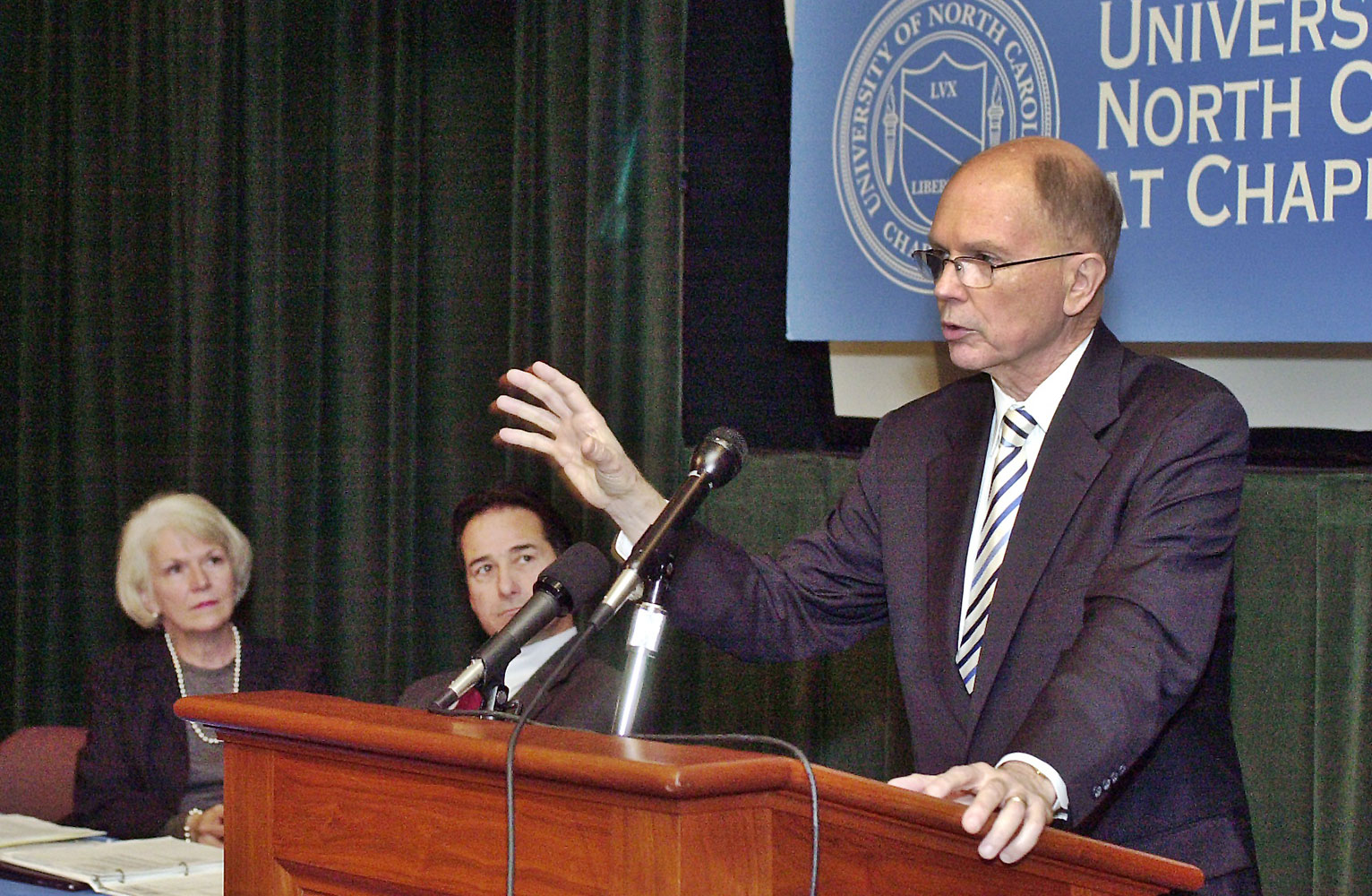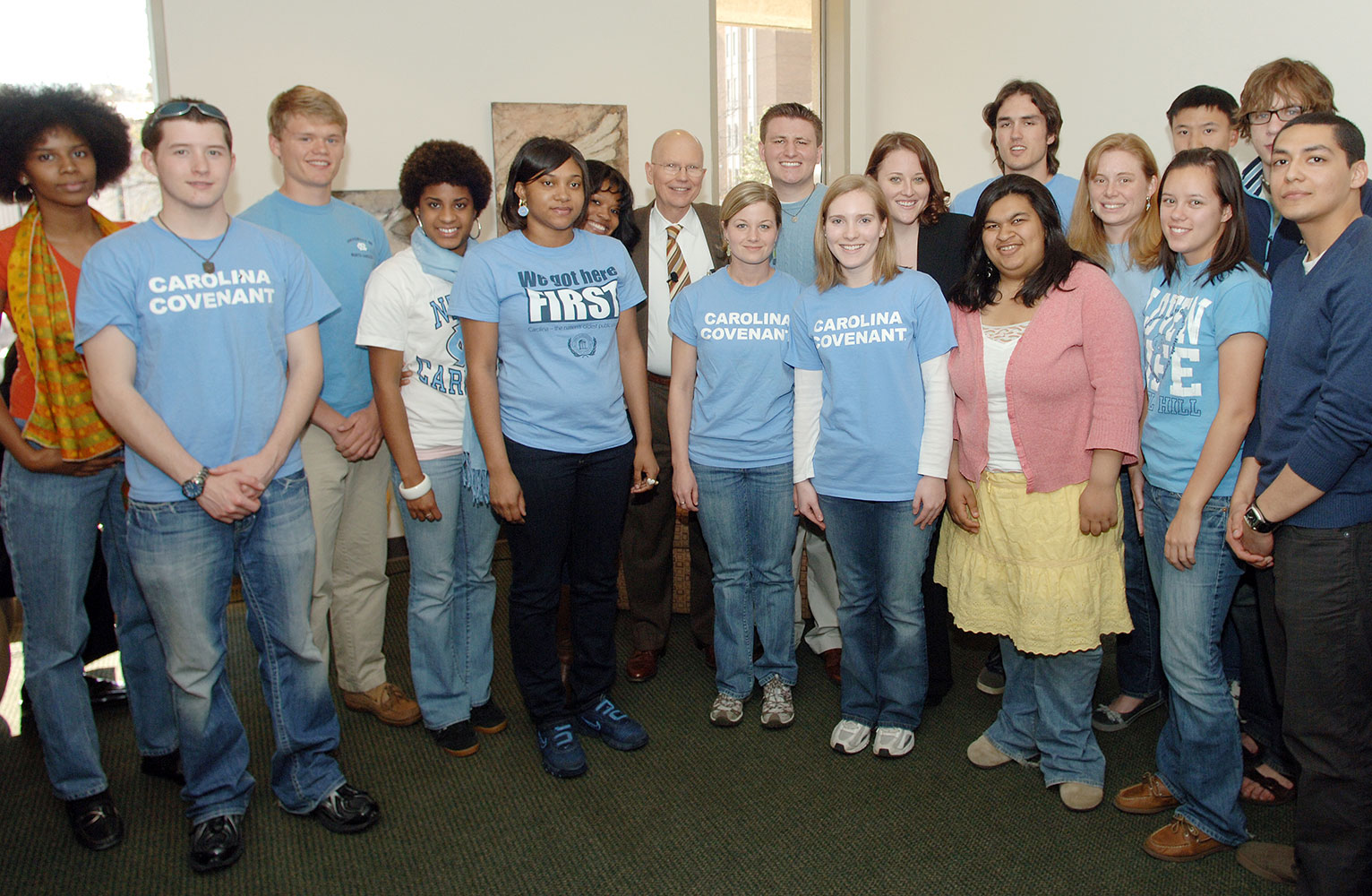
Carolina Covenant Scholar Reina Kinnaly ’20 (Photo by Jeyhoun Allebaugh)
Early champions of the Carolina Covenant reflect on its beginnings.
By Cameron Neale ’25
It was a simple but bold idea, expansive in scope and backed by virtually universal support from anyone who cared about helping all North Carolina students succeed: UNC-Chapel Hill should provide students from lower-income families with a realistic path to graduate from Carolina debt-free.
Under the guidance of James Moeser, Carolina’s chancellor from 2000-2008, and former Director of the Office of Scholarships and Student Aid Shirley Ort, the Carolina Covenant went from that original idea to reality to a model program replicated by dozens of colleges and universities, shaping the college experience for thousands of students at Carolina and throughout the country.
Now, in 2024, the Covenant is celebrating 20 years of service to Carolina students. The groundbreaking program combines state and federal grants, work-study opportunities and privately supported scholarships to help students pay for undergraduate tuition and expenses.
“The Carolina Covenant upholds a core value for the University. The promise of an affordable education ensures that we remain proudly public, genuinely open to talented students of all backgrounds and income levels,” said Ort. “I think that’s central to our character, to what makes Carolina such a vibrant and inspiring place.”
Ort knew firsthand how finances could bar someone from attending college.
When she graduated from high school, her parents didn’t have the money to send her to college. After a push of encouragement from her principal, she applied to Spring Arbor College and funded her education through odd jobs and federal loans.
The Carolina Covenant was her opportunity to make sure prospective students felt that same encouragement to apply to Carolina, backed with the added assurance that once they earned their admission, the University would help them find a way to fund a top-tier education. Since 2004, the Covenant has given over 11,000 students the peace of mind to attend college while avoiding financial burden.
From idea to inception
The idea, then dubbed the “Carolina Compact,” first appeared in 2001.
It emerged from a period of rapidly rising costs for higher education. Across the country, “public universities, hit by historic shortfalls in state revenue, have raised tuition by 10 percent this year, outpacing private colleges and universities,” The New York Times reported in 2003. Ort said tuition at UNC-Chapel Hill had doubled in the years leading up to the Covenant, and the administration worried about students self-excluding themselves from Carolina due to financial fears.
At the time, it was financially impossible to provide an entirely debt-free education to Carolina’s low-income students. But with increases in state and federal funding over the next two years, the “Compact” became more and more of a possibility for Carolina’s students.
Discussions began among top Carolina administrators including Ort; Jerry Lucido, then Associate Provost for Undergraduate Admissions; and then-Provost Robert Shelton before the idea was presented to Chancellor Moeser in 2003.
He approved the program and lent it his full support immediately — with one change. He suggested shifting the name from Compact to Covenant, a change meant to convey how seriously the University took this promise.
“We had the audacity to think we could do it,” Moeser said.

Chancellor James Moeser makes a point during a press conference announcing the Carolina Covenant. (Photo courtesy of UNC-Chapel Hill)
On October 12, 2003, at Moeser’s annual State of the University address, he announced the Carolina Covenant:
“Today, I am proud to announce a new commitment to access for our most needy students that we call the Carolina Covenant, a college-financing agreement between the University of North Carolina at Chapel Hill and low-income students from across the state and nation.”
Moeser landed his role as chancellor at UNC-Chapel Hill after working his way up from professor to dean to provost at universities across the country. But from Lincoln, Nebraska, to Franklin Street, his mission stayed the same — academic freedom.
And to him, the Carolina Covenant embodied just that.
“Academic freedom is one of my core virtues,” said Moeser. “At a university it’s vitally important, and it’s a key to understanding democracy. That’s the hallmark of the Carolina Covenant.”
The first iteration of the Covenant promised all students admitted to Carolina that if their family income was at or below 150% of the federal poverty level they could graduate with zero debt. Research demonstrated that low-income families were reluctant to take on any student loans to pay for college. By relieving families of the stressor, Ort and Moeser hoped to open the University to the best and brightest students from all financial backgrounds, maintaining Carolina’s reputation as a space for critical research and discussion for everyone.
At a politically divisive time when criticism of almost any decision by a public leader was the norm, reaction to Moeser’s announcement was different. Public response, documented in Chancellor Moeser’s archived papers at UNC’s Louis Round Wilson Library, was overwhelmingly positive:
- “James – BRAVO for helping low-income students get Chapel Hill’s great education!”
- “I think this is an amazing, gutsy and principled thing to do. Please send me information on how to donate money to support this program.”
- “Congratulations on the success of your Carolina Covenant program. This is a superb effort on the part of the university, which I know will pay huge dividends.”
Universities across the country, including the University of Virginia and the University of Nebraska, followed Carolina’s model to need-blind admissions with robust financial support for lower-income students and families, reported The New York Times in 2004.
“I just thought that would be a beautiful thing to do,” Moeser said.
The first class
In the fall of 2004, 223 students enrolled as Carolina Covenant Scholars.
As the first Covenant Scholars got their feet on the ground in Chapel Hill and began their classes, the Covenant began to expand beyond purely financial bounds.
“We recognized that it wasn’t enough to simply bring low-income students to campus; we needed to make sure they could participate fully in the academic and cultural life of the University,” said Ort.
College is a difficult transition for people already, and finances can add an additional barrier. With a goal of maintaining high retention and graduation rates, the Covenant aimed to make the move into higher education as smooth as possible for its students.
In 2005, the program expanded support beyond financial aid to meet even more unique needs for Covenant Scholars.

Chancellor James Moeser (center) poses with an early class of Carolina Covenant Scholars. (Photo courtesy of UNC-Chapel Hill)
Through private donations, including from Roy and Wanda Williams and Erskine Bowles, students gained access to counseling, faculty mentoring, museum visits, free tickets to campus performances, and movie and pizza nights — anything that could elevate their experience at Carolina, build community and ensure they completed their degrees.
Between 2003 and 2008, donors gave nearly $10 million to the Carolina Covenant.
Ann Trollinger, associate director of the Carolina Covenant and alumni engagement, emphasized the importance of the faceted approach of the Carolina Covenant. In her eyes, the focus on building well-rounded individuals through the Covenant has sustained the program for 20 years. Faculty mentors, donors and alumni continue to see the relevance and importance of this program in creating equitable access to higher education.
“It all seemed to work,” said Ort. “As adequate grants and scholarships were combined with necessary support services, graduation rates among Covenant Scholars began and continue to climb, virtually eliminating what had previously been an income-related persistence and graduation gap.”
Fulfilling the promise
In looking back on the program, Ort spoke of her satisfaction with how it has thrived at Carolina.
She thinks about how an entire generation of Tar Heels has now been supported by the Covenant: “I now realize that we have Covenant Scholars attending Carolina today who weren’t even born when we came up with the idea!”
The Carolina Covenant team is now looking to the future while taking time this year to celebrate all they’ve accomplished. Current Carolina Covenant Director Candice Powell will share the program’s first strategic plan in 2025.
Groups across campus, including the Young Alumni Leadership Council, are focusing their energy on fundraising for the Carolina Covenant. Fully endowing the program will guarantee its continuance for future generations. While some similar programs at other universities have struggled, the Covenant prides itself on the same principles it announced in 2003.
“It is my proudest accomplishment as a chancellor because I think that it spoke to the values that we say we embody access and accessibility regardless of need,” said Moeser.
Moeser and Ort, the two spearheads of this groundbreaking program, have since retired and stepped away from Covenant administration. But for them, and students and faculty alike, it holds a firm grasp on their memories of Carolina.
“As I look back on the creation of the Carolina Covenant, I am struck by one thing — and that is the brilliance of Chancellor Moeser,” said Ort. “By naming the program the Carolina Covenant, he made clear that it was a promise to both current and future generations of students.
“The message was clear: Carolina is, and will remain, accessible and affordable for academically prepared students from low-income backgrounds.”
Related Stories







